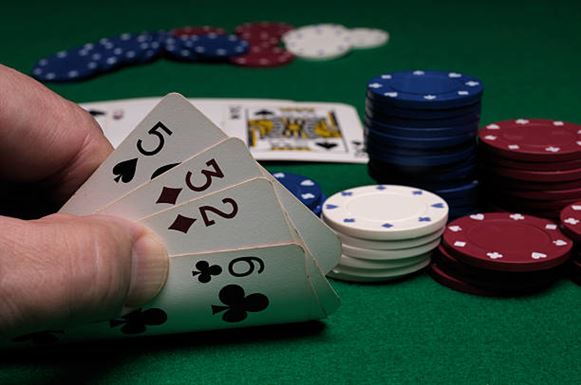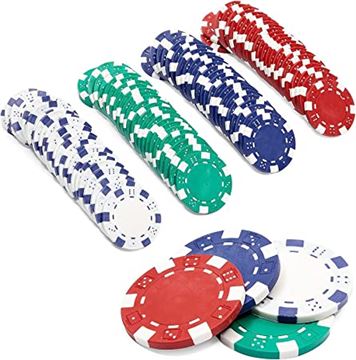Introduction:
Poker is a popular card game that involves skill, strategy, and a bit of luck. While many people enjoy playing poker for entertainment and the thrill of competition, it is important to be aware of the potential risks associated with gambling. Responsible gambling is crucial to ensure that poker remains a fun and enjoyable activity, without leading to addiction or financial difficulties. In this article, we will explore some key strategies and tips to help individuals avoid gambling addiction while playing poker.
The Importance of Setting Limits: How to Avoid Gambling Addiction
Poker is a popular card game that has captivated players for centuries. With its blend of strategy, skill, and luck, it offers an exciting and thrilling experience. However, like any form of gambling, poker can also be addictive and lead to serious consequences if not approached responsibly. In this article, we will explore the importance of setting limits in poker and how it can help players avoid gambling addiction.
Setting limits is crucial when it comes to responsible gambling. It allows players to maintain control over their actions and prevent themselves from getting carried away in the heat of the moment. By establishing boundaries, players can enjoy the game without risking their financial stability or personal well-being.
One of the most effective ways to set limits in poker is by determining a budget. Before sitting down at the table, players should decide how much money they are willing to spend and stick to that amount. This ensures that they do not exceed their financial means and fall into the trap of chasing losses.
Another important aspect of setting limits is time management. It is easy to lose track of time when engrossed in a poker game, but this can be detrimental to one’s well-being. By setting a time limit for each session, players can prevent themselves from spending excessive amounts of time at the table and neglecting other important aspects of their lives.
Furthermore, it is essential to establish a loss limit. Losing is an inevitable part of poker, and it is crucial to accept this fact. By setting a predetermined amount that one is willing to lose, players can avoid the temptation to chase their losses and potentially spiral into a gambling addiction.
In addition to these practical limits, it is also important to set emotional boundaries. Poker can be an emotionally charged game, and it is easy to get caught up in the highs and lows of winning and losing. By setting emotional limits, players can prevent themselves from becoming too emotionally invested in the outcome of each hand. This can help maintain a healthy mindset and prevent the development of an unhealthy attachment to the game.
Transitional phrase: Moving on to the next point, it is crucial to seek support when needed. Recognizing the signs of gambling addiction and seeking help is a vital step in responsible gambling. Addiction is a complex issue that requires professional assistance, and there are numerous resources available for those struggling with gambling problems.
It is also important to surround oneself with a supportive network of friends and family who can provide guidance and encouragement. By sharing one’s concerns and seeking support, players can find strength in their journey towards responsible gambling.
In conclusion, setting limits is of utmost importance when it comes to responsible gambling in poker. By establishing boundaries in terms of budget, time, losses, and emotions, players can enjoy the game without risking their financial stability or personal well-being. Seeking support when needed is also crucial in preventing and addressing gambling addiction. Remember, poker is meant to be a form of entertainment, and by setting limits, players can ensure that it remains a fun and enjoyable experience.
Recognizing Warning Signs: Tips for Avoiding Gambling Addiction
Recognizing Warning Signs: Tips for Avoiding Gambling Addiction
Gambling can be an exciting and entertaining activity, but it is important to approach it with caution. For some individuals, gambling can become an addiction that can have serious consequences on their lives. Recognizing the warning signs of gambling addiction is crucial in order to prevent it from spiraling out of control. In this section, we will explore some tips for avoiding gambling addiction and maintaining responsible gambling habits.
One of the first steps in avoiding gambling addiction is to be aware of the warning signs. These signs can manifest in various ways, such as an increasing preoccupation with gambling, a need to gamble with larger amounts of money to achieve the same level of excitement, or experiencing restlessness or irritability when attempting to cut back on gambling. It is important to pay attention to these signs and take them seriously.
Another tip for avoiding gambling addiction is to set limits for yourself. This can include setting a budget for gambling and sticking to it, as well as setting a time limit for how long you will engage in gambling activities. By setting these limits, you can ensure that gambling remains a recreational activity rather than something that takes over your life.
It is also important to surround yourself with a support system. This can include friends and family who are aware of your gambling habits and can provide support and encouragement when needed. Additionally, seeking professional help, such as counseling or joining a support group, can be beneficial in managing and overcoming gambling addiction.
In order to avoid gambling addiction, it is crucial to have alternative activities and hobbies that can provide a sense of fulfillment and enjoyment. Engaging in activities such as sports, art, or volunteering can help divert your attention away from gambling and provide a healthier outlet for your energy and emotions.
Furthermore, it is important to be mindful of your emotions and mental state when engaging in gambling activities. Gambling can be an escape from reality for some individuals, and it is important to be aware of any underlying emotional issues that may be driving your desire to gamble. Taking care of your mental health and seeking professional help if needed can be instrumental in avoiding gambling addiction.
Lastly, it is important to remember that gambling should be seen as a form of entertainment, not a means to make money. It is easy to get caught up in the excitement and thrill of winning, but it is crucial to approach gambling with a realistic mindset. Understanding that the odds are always in favor of the house and that gambling should be seen as a recreational activity can help prevent the development of a gambling addiction.
In conclusion, recognizing the warning signs of gambling addiction and taking proactive steps to avoid it is crucial for maintaining responsible gambling habits. Setting limits, surrounding yourself with a support system, engaging in alternative activities, being mindful of your emotions, and approaching gambling with a realistic mindset are all important strategies for avoiding gambling addiction. By implementing these tips, you can enjoy the excitement of gambling while ensuring that it remains a healthy and enjoyable activity in your life.
Responsible Gambling Strategies: How to Stay in Control
Poker is a popular card game that has captivated players for centuries. With its blend of skill, strategy, and luck, it offers an exciting and competitive experience. However, like any form of gambling, it is important to approach poker with caution and responsibility to avoid the potential pitfalls of addiction.
Responsible gambling is a concept that emphasizes the importance of maintaining control over one’s gambling habits. It involves setting limits, being aware of the risks, and taking steps to prevent addiction. In this section, we will explore some strategies that can help poker players stay in control and enjoy the game responsibly.
First and foremost, it is crucial to set a budget before sitting down at the poker table. Determine how much money you are willing to spend and stick to that limit. This will prevent you from chasing losses or spending more than you can afford. It is also advisable to separate your gambling funds from your regular finances, ensuring that you do not dip into money meant for essential expenses.
Another strategy to stay in control is to set a time limit for your poker sessions. It is easy to lose track of time when engrossed in the game, so having a predetermined duration can help you maintain a healthy balance. Consider using a timer or alarm to remind yourself when it is time to take a break or stop playing altogether.
Furthermore, it is essential to be aware of your emotions while playing poker. The highs and lows of the game can be exhilarating, but they can also cloud your judgment. If you find yourself becoming overly emotional or frustrated, it may be a sign that it is time to step away from the table. Taking breaks and engaging in other activities can help you regain perspective and prevent impulsive decisions.
In addition to setting limits and being mindful of your emotions, it is crucial to educate yourself about the risks and signs of gambling addiction. Familiarize yourself with the symptoms, such as an increasing preoccupation with gambling, difficulty controlling your gambling behavior, and neglecting other responsibilities. By being aware of these warning signs, you can take proactive steps to address any potential issues before they escalate.
Seeking support is another vital aspect of responsible gambling. If you feel that your gambling habits are becoming problematic, do not hesitate to reach out to friends, family, or professional organizations that specialize in gambling addiction. They can provide guidance, resources, and a listening ear to help you navigate through any challenges you may face.
Lastly, it is important to remember that poker is ultimately a form of entertainment. While it can be tempting to chase big wins or get caught up in the competitive nature of the game, it is crucial to maintain a healthy perspective. Enjoy the game for what it is, and do not let it consume your life or finances.
In conclusion, responsible gambling is essential when it comes to playing poker or any other form of gambling. By setting limits, being aware of the risks, and seeking support when needed, players can enjoy the game while avoiding the potential pitfalls of addiction. Remember, poker is meant to be a source of entertainment, so approach it with caution and responsibility to ensure a positive and enjoyable experience.
Creating a Healthy Balance: Balancing Poker and Responsible Gambling
Poker is a game that has captivated people for centuries. Its blend of strategy, skill, and luck makes it an enticing pastime for many. However, like any form of gambling, poker can become addictive if not approached with caution. In this article, we will explore how to create a healthy balance between poker and responsible gambling, ensuring that the game remains enjoyable without spiraling into addiction.
First and foremost, it is essential to understand the nature of gambling addiction. It is not a weakness or a character flaw but a complex psychological condition that can affect anyone. The thrill of winning, the adrenaline rush, and the desire for more can quickly become all-consuming. Therefore, it is crucial to approach poker with a mindset of responsible gambling from the start.
One way to achieve this is by setting limits. Before sitting down at the poker table, determine how much money and time you are willing to spend. Set a budget and stick to it. This will help prevent impulsive decisions and ensure that you are not risking more than you can afford to lose. Additionally, setting a time limit will help you maintain a healthy balance between poker and other aspects of your life.
Another important aspect of responsible gambling is self-awareness. Pay attention to your emotions and how they may influence your decision-making. If you find yourself becoming overly invested in the outcome of a hand or feeling anxious or irritable when not playing, it may be a sign that you are developing an unhealthy attachment to the game. Take a step back, evaluate your feelings, and consider seeking support if necessary.
Furthermore, it is crucial to surround yourself with a supportive network. Share your intentions of responsible gambling with friends and family who can help keep you accountable. They can provide a fresh perspective and offer guidance when needed. Additionally, consider joining a poker community or support group where you can connect with others who share similar goals and experiences.
In addition to setting limits and seeking support, it is essential to educate yourself about the risks and realities of gambling addiction. Understand the odds of the game and the potential consequences of excessive gambling. This knowledge will help you make informed decisions and approach poker with a level-headed mindset.
Lastly, remember that poker is just a game. While it can be thrilling and rewarding, it should never define your self-worth or become the sole focus of your life. Maintain a healthy balance by engaging in other activities and hobbies that bring you joy and fulfillment. This will help prevent poker from becoming an all-consuming obsession.
In conclusion, creating a healthy balance between poker and responsible gambling is crucial to avoid addiction. Set limits, be self-aware, seek support, educate yourself, and maintain a well-rounded life. By approaching poker with a mindset of responsible gambling, you can enjoy the game while safeguarding your well-being. Remember, poker is meant to be a source of entertainment, not a path to self-destruction.
Seeking Support: Resources for Avoiding Gambling Addiction
Seeking Support: Resources for Avoiding Gambling Addiction
When it comes to gambling, it’s important to remember that it can be a fun and exciting activity, but it can also become addictive. If you find yourself struggling with gambling addiction or want to prevent it from happening, seeking support is crucial. Fortunately, there are numerous resources available to help you navigate this challenging journey.
One of the first steps you can take is to reach out to a professional counselor or therapist who specializes in gambling addiction. These professionals are trained to provide guidance and support to individuals struggling with addiction. They can help you understand the underlying causes of your gambling behavior and develop strategies to overcome it. Additionally, they can assist you in creating a personalized plan to avoid relapse and maintain a healthy relationship with gambling.
Support groups are another valuable resource for those seeking to avoid gambling addiction. These groups provide a safe and non-judgmental environment where individuals can share their experiences, challenges, and successes. Being part of a support group allows you to connect with others who understand what you’re going through and can offer valuable advice and encouragement. It’s important to remember that you’re not alone in this journey, and support groups can provide the sense of community and understanding that is crucial for recovery.
In addition to professional help and support groups, there are also various helplines and hotlines available for individuals struggling with gambling addiction. These helplines are staffed by trained professionals who can provide immediate assistance and guidance. Whether you need someone to talk to, information about treatment options, or advice on how to handle a specific situation, helplines are there to offer support 24/7. It’s important to save these numbers in your phone or keep them easily accessible, so you can reach out whenever you need help.
Online resources can also be a valuable tool in avoiding gambling addiction. There are numerous websites and forums dedicated to providing information, support, and resources for individuals struggling with gambling problems. These platforms offer a wealth of information about the signs and symptoms of addiction, treatment options, and strategies for maintaining responsible gambling habits. Additionally, many online resources provide self-assessment tools that can help you evaluate your gambling behavior and determine if you’re at risk of developing an addiction.
Finally, it’s important to involve your loved ones in your journey towards avoiding gambling addiction. Family and friends can provide invaluable support and encouragement throughout the recovery process. By opening up to them about your struggles, you allow them to understand your situation better and offer their assistance. They can help you stay accountable, provide a listening ear, and help you find alternative activities to replace gambling. Building a strong support system is crucial for long-term recovery and can significantly increase your chances of avoiding relapse.
In conclusion, seeking support is essential for avoiding gambling addiction. Whether it’s through professional counseling, support groups, helplines, online resources, or involving your loved ones, there are numerous avenues available to help you on your journey. Remember, you don’t have to face this challenge alone. Reach out for support, and together, we can overcome gambling addiction and maintain a healthy relationship with this popular pastime.
Mindful Decision-Making: Making Responsible Choices in Poker
Poker is a game that has captivated people for centuries. Its blend of strategy, skill, and luck makes it an enticing pastime for many. However, like any form of gambling, poker can also be addictive and lead to harmful consequences. In this article, we will explore the concept of responsible gambling and how it applies to the world of poker.
Responsible gambling is all about making mindful decisions and taking responsibility for one’s actions. It involves understanding the risks involved in gambling and setting limits to ensure that it remains an enjoyable and controlled activity. When it comes to poker, responsible gambling is especially important because of the potential for addiction.
One of the key aspects of responsible gambling in poker is setting limits. This means deciding how much money and time you are willing to spend on the game and sticking to those limits. It’s easy to get caught up in the excitement of a poker game and lose track of time and money. By setting limits, you can ensure that you don’t spend more than you can afford to lose and that you don’t neglect other important aspects of your life.
Another important aspect of responsible gambling in poker is being aware of your emotions. Poker can be an intense and emotional game, and it’s easy to let your emotions get the best of you. Whether it’s the thrill of a big win or the frustration of a loss, it’s important to stay in control of your emotions. Making impulsive decisions based on emotions can lead to poor choices and potentially harmful consequences. By staying mindful of your emotions and taking breaks when needed, you can make more rational and responsible decisions in poker.
In addition to setting limits and being aware of your emotions, responsible gambling in poker also involves seeking support when needed. If you find that you are struggling with gambling addiction or are concerned about your gambling habits, it’s important to reach out for help. There are many resources available, such as helplines and support groups, that can provide guidance and assistance. Remember, seeking help is a sign of strength, not weakness.
Lastly, responsible gambling in poker also means being mindful of the impact your gambling habits may have on others. It’s important to consider the feelings and well-being of your loved ones and to not let your gambling habits negatively affect your relationships. By being open and honest with your loved ones about your gambling habits and seeking their support, you can create a more responsible and supportive environment.
In conclusion, responsible gambling in poker is all about making mindful decisions and taking responsibility for one’s actions. By setting limits, being aware of your emotions, seeking support when needed, and considering the impact on others, you can enjoy the game of poker in a responsible and controlled manner. Remember, poker is meant to be a form of entertainment, not a means to financial gain or emotional escape. By practicing responsible gambling, you can ensure that poker remains a fun and enjoyable activity for years to come.In conclusion, poker and responsible gambling go hand in hand. To avoid gambling addiction, it is important to set limits on time and money spent on poker, maintain a balanced lifestyle, and seek help if needed. Responsible gambling practices can help individuals enjoy the game while minimizing the risk of developing a gambling addiction.




